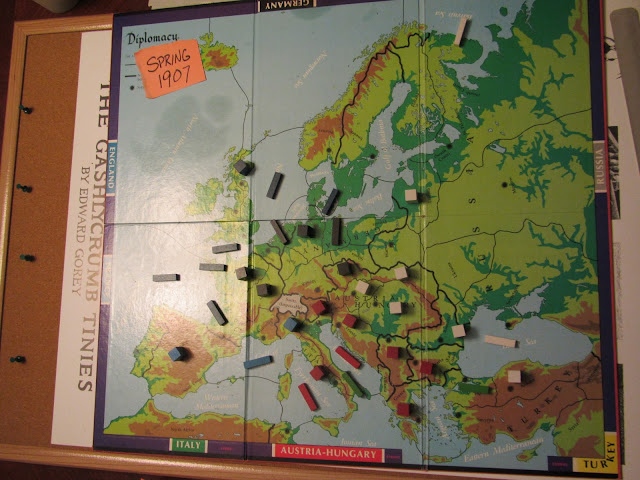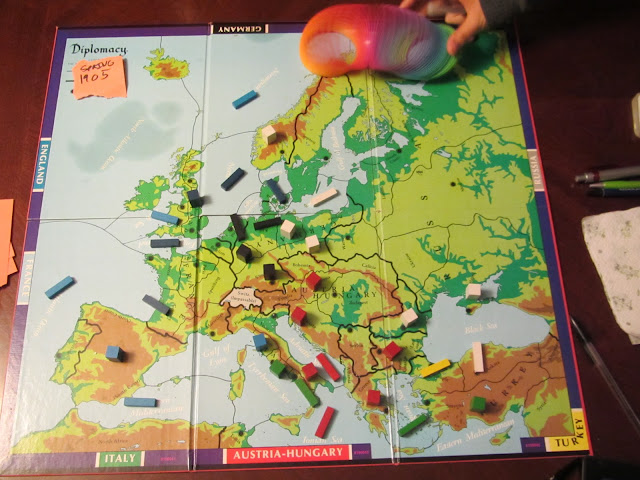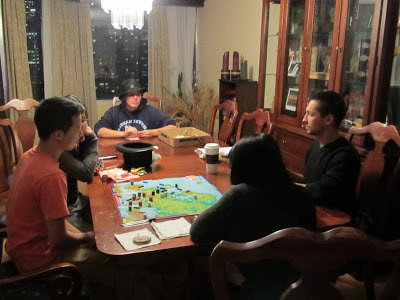Wednesday, January 30, 2013
Diplomacy 1908: The Shape of Things to Come; The Treaty of Savoy
Dear readers,
1908 approaches, a year in which the shape of the conflict in Europe takes on new forms all over the map.
The main feature of 1908 will be the war that is beginning between Germany and England, for these two countries now hold the West between the two of them. The game in the West will come down to which of these two comes out on top in the Atlantic theatre.
Who will control the Atlantic at the end of this game? Nothing less than the entire West of the map is at stake.
Here, France will play an extremely important role: removing France from the picture will harm the chances of victory for either England or Germany in the long term. Expect both countries to be courting France with their best offers in the coming few days.
The fate of Italy is also in the air: can Italy find a way to rebuild her strength and reclaim the Mediterranean, or will Italy be the next casualty of this war?
Here it is once again:
The Treaty of Savoy
The undersigned nations agree to allow the formation of a combined French-Italian state named The Kingdom of Savoy.
The Kingdom of Savoy (international code "S") comprises Naples, Rome, Tunis, Marseilles, Spain, and Portugal (forming a natural defensive border around the Western Mediterranean), and pledges its existence as a peace-keeping force from the Straits of Gibraltar as well as the Ionian Sea. The Kingdom of Savoy forms a natural buffer between England and Austria, minimizing conflict in the Mediterranean.
Signatories are welcomed to respond to this letter.
There are already three supporters to the Treaty, and the international council is beginning to put pressure on the remaining nations to become signatories.
The Treaty would reinstate France and Italy's position, and produce a viable political entity in the Mediterranean.
The benefits to the various major powers are as follows:
Italy and France agree to give up any claim to Paris and Brest (French and German, respectively) and Venice (Austrian), as permanent gains for their invaders.
In exchange, they are to be returned Portugal, Tunis, and Rome, allowing them to build the naval force necessary for control of the Mediterranean.
Austria gains a beneficial relationship with the new Kingdom of Savoy, as a counterbalance to the Western threat (in Austria's case, England). Savoy will guard Austria's exposed Southern flank, allowing Austria to use her full force on the mainland.
Becoming a signatory also places Austria in a better diplomatic position: no longer an invader or genocidal force, but a nation willing to negotiate for peace and to make concessions in order to maintain their international reputation.
Finally, Austria gains Venice as a permanent Austrian possession, accepted by the international community.
Germany and Russia benefit in the Kingdom's existence in that they no longer need to worry about the control of the Mediterranean falling into the hands of England or Austria, which allows them to remain equal sparring partners with those two nations (who would otherwise control the naval theatre at their expense).
Germany gains Paris as a permanent German possession, accepted by the international community.
England gains a peaceful relationship with France (and support against Germany). The Kingdom of Savoy acts as a safeguard against Austrian control of the Mediterranean, allowing England to make a power play for the West of Europe while Savoy maintains her security.
England also gains Brest as a permanent French possession, accepted by the international community.
In short, the Kingdom of Savoy, if allowed to come into existence, creates a nice, equal playing field which all the remaining major powers can use to their advantage as they move into the endgame.
It also gives a chance of survival and regrowth to the French President and the King of Italy, allowing them to recover from their early game mistakes and find a second chance to play a meaningful role in the developing game.
de Oorlog tot de Beschaving vol. 6 (1906-1907)
de Oorlog tot de Beschaving
Since Austria is currently undisputed as a contender for this strategic goal, every other nation on the board (Russia, England, and Germany) benefits from Italy's survival and growth. All the other nations have a vested interested in Italy's success in the near future.
vol. 6 (1906-1907)
The battleground of Europe is transformed in the mid-war period (1906-1907), as Italy and France are decimated and Germany finds a peace accord with Russia and thereby experiences a dramatic revival.
A Turning Point
A great deal turns on 1907: with France's dramatic fall, the game has now passed its midpoint and is sailing rapidly through the mid-game into the endgame. A Diplomacy endgame requires careful thought, as those who keep their blinders on and do not consider the conditions for their nation's victory tend to be left in the dust.
Strategic Considerations
A great deal has changed in Europe. France, having completely abandoned all of her defensive lines and simultaneously retreated from the England assault is quite predictably shattered, losing two-thirds of its force (and two Home Centres). Let it not be said that de Oorlog didn't warn the President of this possibility!
France's collapse creates a very tense situation for England and Germany, as we will see below.
At the same time, Austria nearly wipes out Italy in a bloody and decisive victory over Naples and Rome. The Italians are in tatters as Austrian troops occupy their capital and raid Tunis, turning it into a mercenary base for the new Emperor.
This victory puts Austria into an incredibly powerful position as a potential master of the Mediterranean (an important precondition for Austrian victory - more on this below, as well).
The fundamental question for the nations remaining on the board now becomes: how will they reevaluate their diplomatic leverage? The board has changed, and their positions must adapt with it, or they will be left behind, just like the outdated regime of the French monarchy.
The Minor Powers
One of the best features of the Great War is the way that minor powers necessarily become highly important in the endgame. Although Italy and France are both reduced to two units, the best strategy for most other nations will be to court them aggressively.
Russia, Austria, England, and Germany are now all contenders for the victory. But it is the way they handle France and Italy which will determine their long-term position.
Italy's role here is that of the guardian of the Mediterranean. Both England or Austria need to control the Mediterranean (or at least the Western half of it, in England's case) in order to win.
Since Austria is currently undisputed as a contender for this strategic goal, every other nation on the board (Russia, England, and Germany) benefits from Italy's survival and growth. All the other nations have a vested interested in Italy's success in the near future.
France's role is that of an important "swing state" between German and English interests. The two remaining units can do little on their own, but diplomatically their leverage is extremely strong.
If Germany and England agree to "split" the French territory between the two of them (as they seem to be doing), both nations' chances of victory drop fairly dramatically: the only way French defeat is beneficial to either nation at this point is if that nation can grab BOTH Centres.
Likewise, Austria and Russia both benefit long-term if France can manage to survive (or even regrow).
In this vein, de Oorlog would like to propose an international Treaty:
The Treaty of Savoy
The undersigned nations agree to allow the formation of a combined French-Italian state named The Kingdom of Savoy.
The Kingdom of Savoy (international code "S") comprises Naples, Rome, Tunis, Marseilles, Spain, and Portugal (forming a natural border around the Western Mediterranean), and pledges its existence as a peace-keeping force from the Straits of Gibraltar as well as the Ionian Sea. The Kingdom of Savoy forms a natural buffer between England and Austria, minimizing conflict in the Mediterranean.
Signatories are welcomed to respond to this letter.
Finally: The Shape of the Endgame
Moving into the endgame, a very significant change takes place in terms of the way the powers navigate the map of Europe:
Currently, only Russia, Austria and Germany play a meaningful role in the land battle over Europe.
The significance of this situation has two very important ramifications:
1. If England cannot find a way to become a player on the continent (by building armies and convoying them onto the mainland), the English will quickly lose their momentum.
2. Few rapid developments in the land war are now possible: the large numbers of well-coordinated troops make any significant land assault effectively trench warfare, and no participants can expect rapid success.
This means that the nature of the war is shifting at a fundamental level:
The true valuable territory from 1908 forwards is the sea.
This is not unusual in the endgame: the final outcome of the game will depend largely on the naval battle, not the events on land.
Last year's France won a relatively easy victory by simple virtue of controlling the entire Atlantic as well as the Mediterranean: without any rivals in the Atlantic, France could move fleets all the way to the Ionian, claiming Tunis (a highly difficult final objective for any Western naval power aiming for the win). (See attached diagram.)
England's victory in this game would look exactly the same: the Queen will need to claim the entire coastline from Denmark to Portugal, land armies on the mainland (so as to capture Germany and France), and then be the first to sail fleets into the Mediterranean so as to claim Tunis and lay siege to Italy.
England controls the entire Atlantic already: if the Queen can capture the coastal territories (Iberia and the Netherlands), she will be 90% of the way to victory. However, she will also need to look ahead so that she can get those fleets into the Mediterranean before Austria (or the Kingdom of Savoy) manages to lock down the Straits of Gibraltar.
Along the same lines, Germany can see the importance of the Atlantic battle: as long as England controls the Atlantic, Germany's fate is sealed. No matter what happens in the East and on the mainland, Germany cannot win the game because of the constant threat from the sea.
England's fleets threaten German land; the German armies cannot threaten English territories. This means the most likely victor in the West is England. Without a presence in the Atlantic, Germany's fate is without hope: no matter what else happens, in the endgame those fleets will simply move in and remove Germany from the game.
(Faithful readers will note that in early issues of de Oorlog the importance of controlling the North Sea for Germany was heavily emphasized. The conquest of the North Sea is the single most important objective for Germany: without it, German victory is almost impossible.)
The outcome of the English/German war will be of great importance to the rest of the board. Can Germany continue its revival, growing in strength to rival and eclipse England in the West? This is where France is key: without French help, Germany is unlikely to win this battle.
Similarly, in the East the most important outcome is the control of the Mediterranean. Austria needs to control this area and to send fleets West to the Straits of Gibraltar in order to establish a defensible perimeter (without which Austria cannot make her own bid for the victory). Italy and England have a heavy stake in the Battle of the Mediterranean: fortunately for Austrian plans, only a single Italian non-Austrian fleet remains in the area.
Russia can do little to interfere in either battle, having few naval resources. Their difficult situation with Austria appear to be one of war, but diplomatic overtures have also been attempted by both sides, so the future is unclear. In any case, however, Russian diplomacy will certainly be framed in terms of these two vital areas:
In 1909-1911, who will control the two major bodies of water on the Calhamer map?
Will the English remain the unchallenged Atlantic power? (And therefore utterly invincible to any assailants...)
How will the possession of the Mediterranean pan out between the various nations on the board? Will this region fall to the Austrian navy (as it has so far), or will Italy and/or England manage to challenge the Emperor's grasp? (After all, Austria only has two fleets, a serious lack which has been pointed out in de Oorlog again and again.)
Tuesday, January 22, 2013
Wednesday, December 12, 2012
1905
Italy and Austria-Hungary feast on the remains of . . . a train?
England is not impressed with the competition. Such a very classy Queen.
SPRING 1905
France negotiates with Austria-Hungary. What are they plotting?
Turkey and Italy in last minute talks - can peace be found on the edge of Europe?
The Queen and the Czarina laughing at the misfortunes of other nations?
France seems pretty happy . . .
Russia advises on the ways of war.
A very casual conference?
France's plotting or just listening to Italy?
Russia discusses their moves in a moment of privacy.
This is an Army.
This is a fleet.
This is also a fleet. Move over Planking, the new hip thing is fleeting.
East meets West. Will they meet in the middle?
FALL 1905
Goodbye Turkey, you will be missed.
de Oorlog tot de Beschaving vol. 4 (1904)
de Oorlog tot de Beschaving
vol. 4 (1904)
War is upon Europe now: every nation has dipped her toe into the cauldron of strife and death, fought, conquered, or lost.
In the East, the basic momentum developed in 1902-1903 continues on its resolute path:
Turkey holds on to Constantinople with an iron grip, and survives another Italian assault due to Russian support. Turkey looks likely to live to see another day after all. However, any planning Turkey is engaged in during 1904-1905 is likely long-term, as short-term concerns for Turkey are at the behest of the Sultan's neighbours. On the upside, Italy's falling fortunes could provide an opening for Turkish resurgence and regrowth.
Italy continues his assault on Turkey, only to switch gears to attack Greece in the Fall. 1904 is a painful year, as Italy's only success is his move to the Ionian (which the Austrian fleet neglected to defend). With the loss of Venice and further progress against Turkey looking less and less likely, Italy has some difficult decisions to make. As predicted earlier, his position against Austria-Hungary is a rapidly-deteriorating one, and if France gets involved, he could be looking at the loss of Smyrna, Rome or Naples, and Tunis in 1905. How will Italy find a way to turn his fortunes around? His position is not obvious: some clever thinking will be needed here if Italy is not to share Turkey's fate.
Russia continues the trench war against Germany, but on this front nothing is likely to move for some time. Growing gently, Russia is finally recovering from her near-disaster early game. The extra unit build in Sevastopol will give Russia extra leverage in Anatolia, putting the Czarina on equal footing with her competitors in the region. A recovery of Smyrna by Turkish forces in the Fall is possible if Russia continues to support the Sultan.
Austria-Hungary continues her aggressive and dominant streak. Of the last three Chestnut Diplomacy games, two ended in Austrian victories and another saw Austria as the dominant power in Europe for half the War. The Empress could be well on the way to perpetuating that trend. However, Austria-Hungary is seriously feeling her lack of a naval force. Although in terms of units she outnumbers Turkey and Italy put together (even with the potential inclusion of the French fleet in the Western Mediterranean!), she is hopelessly outnumbered on the sea. So far, she has not even been able to leave the Adriatic, and her naval presence is tenuous at best. However, if Austria can move against Italy quickly enough to control the Mediterranean before France settles his war with England, Austria-Hungary will quickly become the strongest power on the board.
In the West, however, things are more dynamic, changing rapidly from year to year:
Germany continues to shrink slowly, and is now reduced from the strongest Western power to the weakest. No obvious conquests present themselves for the German: he will have to wait this one out and look for his opening in the years to come unless he can make peace with Russia quickly. However, what will such a peace cost him?
France moves back into her starting position as the leading power in the West at six units. The new fleet build in Brest--as well as the fleet ransacking Edinburgh--means that France will be gunning for England in the near future: this conflict will be burning hot for a few years yet. France always needs to put England out of commission before becoming a globally effective power: to do otherwise is to risk disaster from the sea. In the absence of war with Germany, France's problem in Diplomacy is fairly straight-ahead: how can the English Queen be knocked off her pedestal and forced to bend her knee?
In last year's War, France accomplished this through force and diplomacy, first land on the British Isles (as our France has just done), and then turn the British into a vassal state fighting her wars abroad under French colours. From there, the road to victory for France is short (and lies directly through German lands).
However, this France will also need to worry about potential Austrian hegemony: after all, if the Mediterranean becomes unified under the red flag, France is the logical next target. In that case, France often finds it beneficial to support Italy or Turkey against Austria, just to prevent this situation.
The question, then, is: which matter will be settled first? That is the President's concern.
England, however, is no pushover. Although the Queen made a few errors in 1904 (and thereby lost Edinburgh), she traded that unit for a much improved position. She now holds the North Sea, the Mid-Atlantic, and therefore can take the Channel at her leisure. That fleet in the Mid-Atlantic will require at least two, and maybe three, French units to handle, since it can retreat to three different French Centres (Portugal, Spain, and Brest) if France decides to dislodge her.
Unless the French fleet in Edinburgh can find a way to link up with its fellows, it will be forced out and probably forced to disband by the end of the year.
Lots of difficult choices all around. What surprises will 1905 bring?
Wednesday, December 5, 2012
Subscribe to:
Posts (Atom)














































